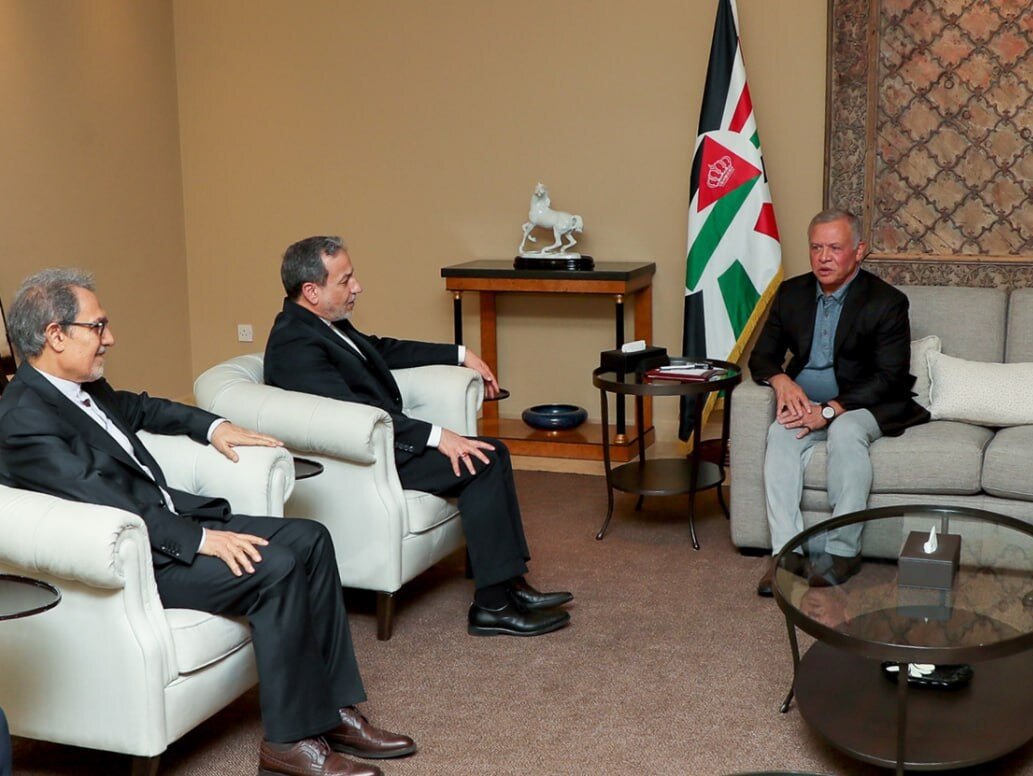Countering Israel's warmongering through active diplomacy
Following discussions with senior officials in Jordan, Araqchi arrived in Cairo to continue his diplomatic mission

TEHRAN - In a crucial diplomatic meeting, Iran's Foreign Minister Abbas Araqchi held discussions with Jordan's King Abdullah II, emphasizing the urgent need for enhanced cooperation among Muslim nations to counter Israel's ongoing military actions.
The talks, held on Wednesday in Amman, centered around regional instability, particularly in Gaza and Lebanon, where the humanitarian situation has become increasingly dire.
Araqchi expressed deep concern over the devastating conditions faced by displaced people in Gaza and Lebanon, who are suffering from severe shortages of food, water, and medical supplies. The Iranian Foreign Ministry’s readout of the meeting highlighted Araqchi’s call for Islamic countries to unite and marshal resources to deliver humanitarian aid to those in need.
King Abdullah II echoed these concerns, stressing the importance of solidarity to curb the growing conflict and instability in the region. He reaffirmed Jordan's commitment to contributing to initiatives aimed at preserving regional stability and addressing the worsening humanitarian crisis.
Both leaders agreed on the necessity of continued collaboration to bolster security in West Asia, underscoring their determination to strengthen bilateral relations.
‘We should prevent the region from sliding further into chaos’
Earlier on the day, Araqchi met with Jordan’s Foreign Minister Ayman al-Safadi to discuss the urgent need for cooperation to prevent the region from sliding further into chaos.
Araqchi emphasized that countries across West Asia must work together to halt the escalation of violence and protect the region’s collective security.
Al-Safadi voiced serious alarm over the deteriorating security landscape, particularly the toll on civilians in Palestine and Lebanon. He reiterated Jordan's stance that the ongoing violence must stop and called for an end to Israeli aggression.
Both officials stressed the importance of regional cooperation, not only in addressing the conflict but also in mobilizing humanitarian efforts to assist refugees in Gaza, Lebanon, and Syria.
The Iranian foreign minister’s visit to Jordan is part of a broader diplomatic tour aimed at deescalating tensions in the region. His recent travels have taken him to Syria, Saudi Arabia, Lebanon, Qatar, Iraq and Oman, where he has sought to forge alliances and build consensus on ways to end the Israeli military’s assaults on Palestinian and Lebanese civilians.
Araqchi’s visit to Amman marks the first by an Iranian foreign minister to Jordan since 2014, signaling a renewed push for diplomatic engagement between the two nations.
In his public remarks, Araqchi reiterated Iran’s commitment to regional stability and called for stronger efforts to prevent further bloodshed. The Iranian Foreign Ministry later announced that Araqchi would continue his diplomatic mission with upcoming visits to Egypt and Turkey to further discuss efforts to end the violence.
In a post on X, formerly known as Twitter, Iran's Foreign Ministry spokesman Esmaeil Baqaei emphasized the country’s ongoing diplomatic outreach is intended to promote peace in West Asia. He noted that Araqchi’s talks in Jordan are part of Iran’s broader strategy to stop Israel’s genocidal actions and to prevent further escalation of war in the region.
This renewed diplomacy follows an August visit to Tehran by Jordanian Foreign Minister Ayman al-Safadi, marking the first high-level talks between Jordan and Iran in two decades. During that visit, al-Safadi pledged Jordan's support for closer cooperation with Iran to achieve lasting peace and stability in the region. He condemned the assassination of Palestinian leader Ismail Haniyeh, characterizing it as part of Israeli Prime Minister Benjamin Netanyahu’s broader plan to expand conflict across West Asia.
Israel initiated its large-scale military campaign against Gaza on October 7 last year, following a surprise operation by Hamas known as Operation Al-Aqsa Storm. The operation was launched in retaliation for Israel’s escalating violence and oppression against the Palestinian people.
Since the conflict began, the Gaza health ministry reports that at least 42,344 Palestinians, the majority being women and children, have been killed by Israeli forces. In addition, 99,013 others have been wounded during the ongoing assaults.
The Israeli regime has also expanded its military actions beyond Gaza, intensifying attacks on Lebanon. In recent weeks, these attacks have mainly targeted Beirut. Notably, in late September, Israeli airstrikes on the Lebanese capital resulted in the assassination of Sayyed Hassan Nasrallah, the leader of Hezbollah, Lebanon's Resistance movement.
In addition to its military offensives, Israel has been responsible for the assassination of prominent Resistance figures, including Ismail Haniyeh, chief of the political bureau of Hamas. Haniyeh was killed in his temporary residence in Tehran just hours after attending the inauguration ceremony of Iranian President Masoud Pezeshkian. A commander of the Islamic Revolution Guards Corps (IRGC) was also assassinated in Lebanon.
In response to escalating tensions, on October 1, Iran launched a large-scale missile attack targeting Israeli military, espionage, and intelligence installations across the occupied territories. The operation, named "True Promise II," was reportedly successful, with 90% of the missiles striking their intended targets.
